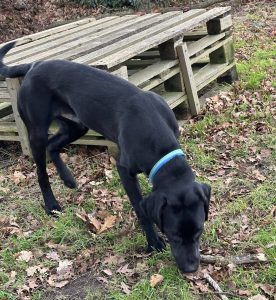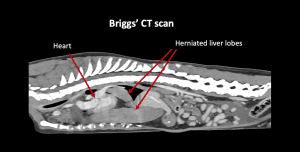Puppy saved after organs become trapped
February 21, 2024
A labrador retriever puppy whose internal organs had moved and become trapped is on the road to recovery following emergency surgery at a leading Essex animal hospital.

Young Briggs, who is being trained as a sniffer dog, was gravely ill when he was referred to Southfields Veterinary Specialists where a diagnosis confirmed a congenital problem whereby organs in the abdomen move into the chest and pericardium, which is a thin sac of tissue enclosing the heart.
Briggs’ only chance of survival was an emergency operation at renowned animal hospital Southfields to replace his abdominal organs and repair the hole in his diaphragm.
Worried owner Ruth Bond from Norwich, who owns Alpha Canine Specialists with her husband Chris Bond, said: “We first noticed a problem with Briggs after he had been fed and then projectile vomited.”
“We checked his gums, which were cold, and his limbs from the elbows down were also cold. He had no energy and went downhill very quickly becoming critical.”
Briggs’ serious medical condition is known as a peritoneopericardic diaphragmatic hernia (PPDH), whereby the diaphragm does not develop properly and a hole is present connecting the abdomen with the pericardium.
This can allow the organs in the abdomen to move into the chest and inside the pericardium. If these organs become entrapped, they can become engorged and grow in size, pressing against the heart and hindering the heart’s ability to pump blood around the body. This can also cause the entrapped organs to suffer tissue death.
Briggs’ rapid decline meant his owners drove in the early hours of the morning to get to Southfields, where the soft tissue surgery and emergency and critical care teams were waiting to spring into action.
A CT scan revealed why Briggs was in shock, as part of his liver was trapped and blood couldn’t reach it.

This was causing release of toxins which were making Briggs very sick with a condition called systemic inflammatory response syndrome (SIRS), causing his blood pressure to become critically low and the subsequent development of severe arrhythmias, all caused by the toxins from his liver. SIRS can be life-threatening if not treated early and aggressively.
Carlos Rubiños Alonso, specialist in small animal surgery at Southfields, moved Briggs’ liver back into his abdomen and repaired the hole in his diaphragm. Unfortunately, part of his liver suffered permanent damage due to the entrapment. Leaving this in place could have proved fatal, so part of his liver was removed.
Briggs was then transferred to Southfields’ intensive care unit, where specialist Kate Turner managed his critical care.
Natalie Heathcote, a surgery intern involved in Brigg’s care, said: “Thirty-six hours following his surgery, we knew he felt better when he gave us his favourite Southfields toy monkey for us to play with him.
“He was reunited with his family after six days in hospital where he enjoyed the rest of his two-week recovery on the couch, now with his very own toy monkey.”
Briggs’ owner Ruth added: “We were shocked and devastated thinking we were going to lose our six-month-old labrador puppy.
“Natalie and all the team at Southfields kept us up to date, initially two to three times a day until Briggs got over the worst. Once he was stable and improving, Natalie rang us every morning to give us updates.
“The great news is that Briggs’ quality of life is better now than it has ever been. He is now more energetic and is enjoying giving his brother a run for his money! In the next few weeks, Briggs will begin his training as our next drug detection dog.”
For more information on Soft Tissue Surgery at Southfields Veterinary Specialists, click here.


